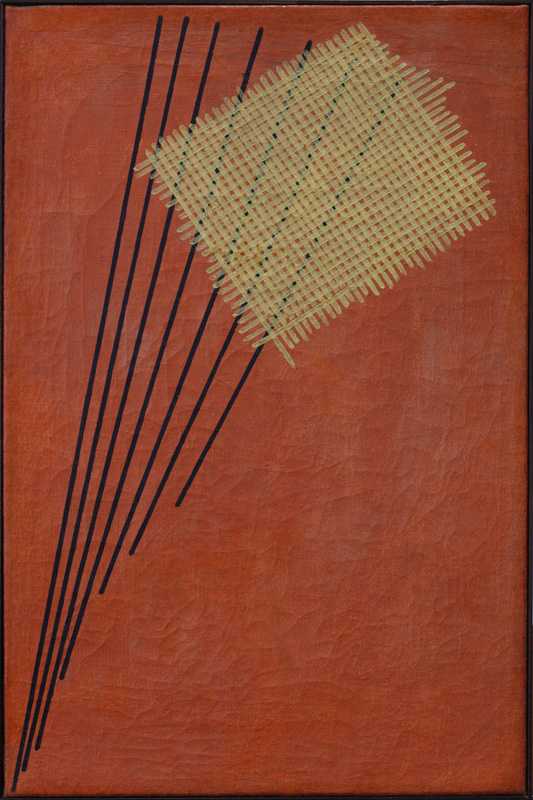THE RAY OF DISPLACEMENT (2)
By:
January 14, 2024

Construction no. 95 (1919)
Harriet Prescott Spofford’s “The Ray of Displacement” — which makes the shocking suggestion, at one point, that Jesus may have been a dimension-hopping scientist — was first published October 1903 in The Metropolitan Magazine, with illustrations by Lester Ralph. It has appeared in proto-sf collections edited by Sam Moskowitz, Mike Ashley, and others. HiLoBooks is pleased to serialize it here for HILOBROW’s readers.
ALL INSTALLMENTS: 1 | 2 | 3 | 4 | 5 | 6 | 7 | 8.
My mind was flying like the current through my coils. How could I restore the carbon to its original, as I must, if at all, without touching it, and how could I gain time without betraying my secret? “You are very short,” I said. “What would you do with your officer?”
“Give you up! Give you up, appear against you, and let you have a sentence of twenty years behind bars.”
“Hard words, Mr. Brant. You could say I had your property. I could deny it. Would your word outweigh mine? But return to the office in five minutes — if it is a possible thing you shall —”
“And leave you to make off with my jewel! Not by a long shot! I’m a bad man to deal with, and I’ll have my stone or —”
“Go for your officer,” said I.
His eye, sharp as a dagger’s point, fell an instant. How could he trust me? I might escape with my booty. Throwing open the window to call, I might pinion him from behind, powerful as he was. But before he could gainsay, I had taken half a dozen steps backward, reaching my batteries.
“Give your alarm,” I said. I put out my hand, lifting my lever, turned the current into my coils, and blazed up my Y-ray for half a heart-beat, succeeding in that brief time in reversing and in receiving the current that so far changed matters that the thing I touched would remain normal, although I was left still so far subjected to the ray of the less displacement that I ought, when the thrill had subsided, to be able to step through the wall as easily as if no wall were there. “Do you see what I have here?” I most unwisely exclaimed. “In one second I could annihilate you —” I had no time for more, or even to make sure I was correct, before, keeping one eye on me, he had called the officer.
“Look here,” he said again, turning on me. “I know enough to see you have something new there, some of your damned inventions. Come, give me my diamond, and if it is worth while I’ll find the capital, go halves, and drop this matter.”
“Not to save your life!” I cried.
“You know me, officer,” he said, as the blue coat came running in. “I give this man into custody for theft.”
“It is a mistake, officer,” I said. “But you will do your duty.”
“Take him to the central station,” said Mr. Brant, “and have him searched. He has a jewel of mine on his person.”
“Yer annar’s sure it’s not on the primmises?” asked the officer.
“He has had no time —”
“Sure, if it’s quick he do be he’s as like to toss it in a corner —”
I stretched out my hand to a knob that silenced the humming among my wires, and at the same time sent up a thread of white fire whose instant rush and subsidence hinted of terrible power behind. The last divisible particle of radium — their eyeballs throbbed for a week.
“Search,” I said. “But be careful about shocks. I don’t want murder here, too.”
Apparently they also were of that mind. For, recovering their sight, they threw my coat over my shoulders and marched me between them to the station, where I was searched, and, as it was already late, locked into a cell for the night.
I could not waste strength on the matter. I was waiting for the dead middle of the night. Then I should put things to proof.
I confess it was a time of intense breathlessness while waiting for silence and slumber to seal the world. Then I called upon my soul, and I stepped boldly forward and walked through that stone wall as if it had been air.
Of course, at my present displacement I was perfectly visible, and I slipped behind this and that projection, and into that alley, till sure of safety. There I made haste to my quarters, took the shelf holding the carbon, and at once subjected it to the necessary treatment. I was unprepared for the result. One instant the room seemed full of a blinding white flame, an intolerable heat, which shut my eyes and singed my hair and blistered my face.
RADIUM AGE PROTO-SF: “Radium Age” is Josh Glenn’s name for the nascent sf genre’s c. 1900–1935 era, a period which saw the discovery of radioactivity, i.e., the revelation that matter itself is constantly in movement — a fitting metaphor for the first decades of the 20th century, during which old scientific, religious, political, and social certainties were shattered. More info here.
SERIALIZED BY HILOBOOKS: James Parker’s Cocky the Fox | Annalee Newitz’s “The Great Oxygen Race” | Matthew Battles’s “Imago” | & many more original and reissued novels and stories.
